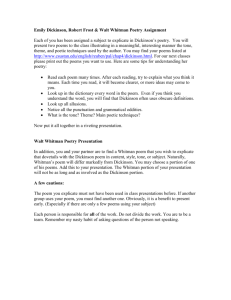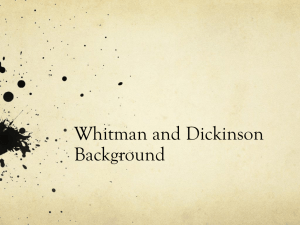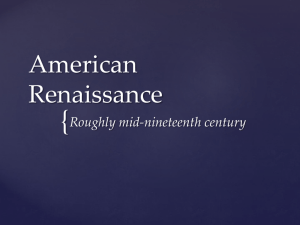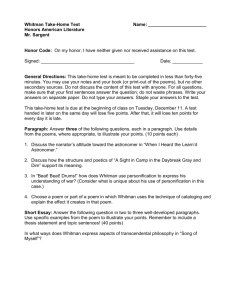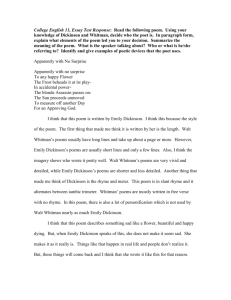620:153(g) American Poetry to 1914 ...
advertisement
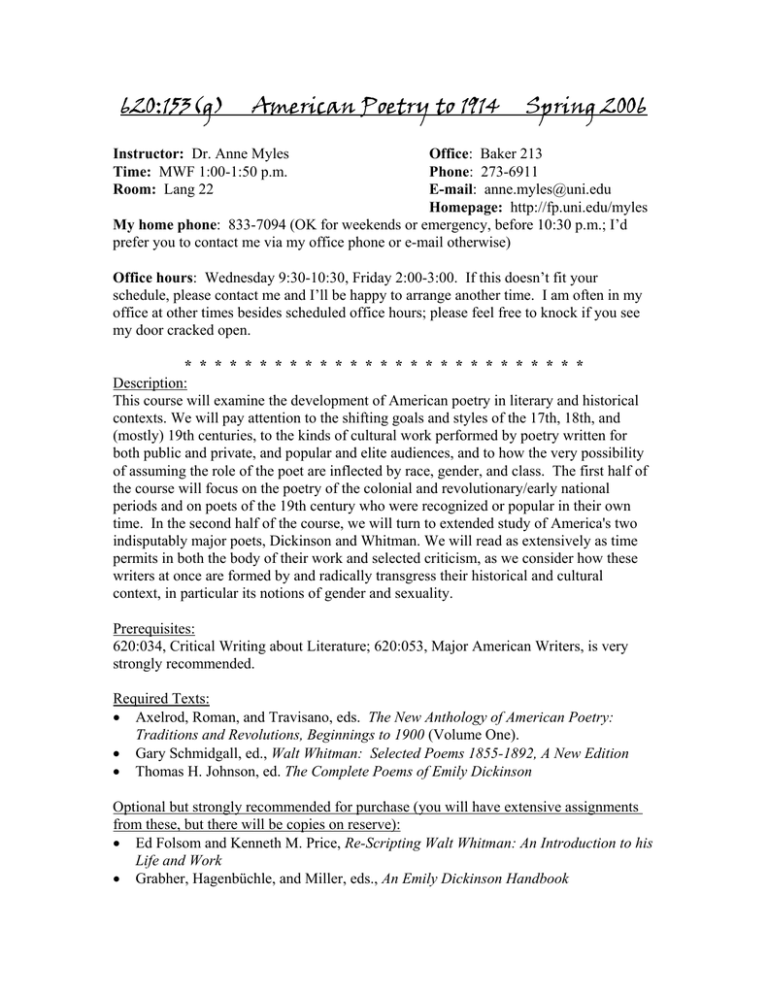
620:153(g) American Poetry to 1914 Spring 2006 Instructor: Dr. Anne Myles Time: MWF 1:00-1:50 p.m. Room: Lang 22 Office: Baker 213 Phone: 273-6911 E-mail: anne.myles@uni.edu Homepage: http://fp.uni.edu/myles My home phone: 833-7094 (OK for weekends or emergency, before 10:30 p.m.; I’d prefer you to contact me via my office phone or e-mail otherwise) Office hours: Wednesday 9:30-10:30, Friday 2:00-3:00. If this doesn’t fit your schedule, please contact me and I’ll be happy to arrange another time. I am often in my office at other times besides scheduled office hours; please feel free to knock if you see my door cracked open. * * * * * * * * * * * * * * * * * * * * * * * * * * * Description: This course will examine the development of American poetry in literary and historical contexts. We will pay attention to the shifting goals and styles of the 17th, 18th, and (mostly) 19th centuries, to the kinds of cultural work performed by poetry written for both public and private, and popular and elite audiences, and to how the very possibility of assuming the role of the poet are inflected by race, gender, and class. The first half of the course will focus on the poetry of the colonial and revolutionary/early national periods and on poets of the 19th century who were recognized or popular in their own time. In the second half of the course, we will turn to extended study of America's two indisputably major poets, Dickinson and Whitman. We will read as extensively as time permits in both the body of their work and selected criticism, as we consider how these writers at once are formed by and radically transgress their historical and cultural context, in particular its notions of gender and sexuality. Prerequisites: 620:034, Critical Writing about Literature; 620:053, Major American Writers, is very strongly recommended. Required Texts: • Axelrod, Roman, and Travisano, eds. The New Anthology of American Poetry: Traditions and Revolutions, Beginnings to 1900 (Volume One). • Gary Schmidgall, ed., Walt Whitman: Selected Poems 1855-1892, A New Edition • Thomas H. Johnson, ed. The Complete Poems of Emily Dickinson Optional but strongly recommended for purchase (you will have extensive assignments from these, but there will be copies on reserve): • Ed Folsom and Kenneth M. Price, Re-Scripting Walt Whitman: An Introduction to his Life and Work • Grabher, Hagenbüchle, and Miller, eds., An Emily Dickinson Handbook 2 Required Work: 1. During the course of the semester you will write four short papers (around 3-5 pages). See pages 10-11 of this syllabus for more information including the topics. These are designed to give you practice in different ways of approaching poetry and develop your skill in writing about poetry without putting too much of your grade at stake in each paper. 2. One of these papers will draw on secondary criticism on Whitman or Dickinson, which you will be assigned to present in a panel discussion with other students. 3. For your final work in the course, you will have a choice of how you wish to be evaluated. One option is to do a longer final project (10-15 pages), either A) a fuller critical/researched essay that expands upon one of your short papers, or B), as an option for English Teaching majors, a fully-developed curriculum plan for a 2-4 week high school class unit on some aspect of pre-1914 American poetry. The other option is a final exam that will involve both a take-home essay portion and a timed section with identifications and short answers. Grading: Your course grade will be determined by the percentage of points that you earn, minus any subtractions for poor attendance or late work. Especially strong class participation will strengthen your final grade if your grades for written work do not seem to me to fully reflect your overall performance in the course. The total number of points possible for the semester may vary slightly from this estimate. 4 short papers Final Paper/Project/Exam Whitman/Dickinson panel Attendance & participation Total 200 points total (50 pts each) 100 points 15 points 25 points ________ 340 points* *5 points extra credit will be given if you attend a poetry reading, one of the Hearst Lectures, or other event sponsored by the English Department and write up a page on your experience. Non-sponsored events may count for extra credit if they seem appropriate (ask first). Your semester grade will be calculated based on the following standard percentage scale out of the total points possible: A AB+ B 95% 90% 87% 84% BC+ C C- 80% 77% 74% 70% D+ D D- 67% 64% 60% 3 If you are unable to complete all the work by finals week and wish to receive a grade of I (Incomplete) you must request this of me specifically before the beginning of finals week. However, I will not give Is to people who have vanished for much of the semester and make a sudden late reappearance. According to University policy, the final date you may drop the class and receive a W on your transcript is Friday, March 10. Deadlines: Work is due on the date specified. Papers are normally due at the beginning of class, but I will not penalize you so long as they are in by 5 p.m. on that day. (Do not skip class because you’re having trouble with your printer, etc.) There will be subtractions from your grade for late work, increasing with the length of time the paper is late. In those cases I will give the paper a “merit grade” which lets you know how I responded to the paper in itself, and the official “recorded grade” which factors in the lateness. I am willing to negotiate extensions requested at least one class in advance, preferably more. Except in special circumstances where you’ve made a specific arrangement with me, I will not accept papers more than a week after they are due. E-mailing me your paper as a Word attachment is acceptable if you have it done but can’t make it to campus. Revision Policy: You may revise one of your short essays for a higher grade (time-wise, it would make sense to do this with one of the first two; I doubt there will be time to revise the third and certainly not the fourth.) However, you need to meet with me first to go over my comments and your revision plans. I expect substantial rethinking/rewriting in a revised paper; except in special, mutually agreed-upon cases, I will return unmarked a revision that contains only mechanical or sentence-level changes. When you submit a revised essay, you must also attach the original copy of the first version along with my comments and grade sheet; I cannot evaluate your changes otherwise. I will accept revisions until Friday of the last week of regular class (i.e. prior to finals week). If you are unhappy with your marks on other written work you have submitted, please consult with me and we’ll determine whether, and how, you might improve your score on these or your ultimate grade in the class. Obviously, the earlier in the semester we discuss this, the more opportunity there is for you to make a meaningful difference in your grade. Format for Submitting Class Work: All essays must be word-processed/typed in a plain, average-sized font, double-spaced, with approximately 1” margins on all sides, on 8 1/2” x 11” plain paper. I recommend Times Roman 12-pt. font (as in this syllabus) or something similar. No separate title page is necessary. At the top of the first page of your paper (I don’t care which corner[s]), include your name, the name of this course, and the date. Centered beneath that, give your paper a title that gives some idea what it is about – do 4 not use just the title of the work you are writing about. Double-spacing between the title and the beginning of the text makes it easier to read. Also, please number your pages -do so by hand if you forget to do it on the computer. In a separate page at the end of your paper, list all the texts you have used in the paper in correct MLA style, unless my assignment guidelines specify that this is not required. All quotations from the text or direct references to passages in the text of the work(s) you are writing about must be followed by page references. I expect prose, poetry, and dialogue to be quoted in the correct form(s). See the guidelines on pages 13-14 of this syllabus for information on how to quote poetry correctly. Proofread your paper carefully (spell-checkers help but won’t do the hole job [see?]); numerous typos and other errors you could easily have fixed make you look careless or indifferent and will detract from your grade, probably more than one or two honest mistakes in syntax will. Also, be sure to save all your work on a disk or flash drive, both completed papers and important writing in progress. On occasion papers do get misplaced during the grading process – or your computer may crash. Don’t let this become a crisis! Attendance: Expected and required. I do take attendance in class, and attendance and participation count for a percentage of your grade. Legitimate reasons for missing class include your own illness; a death or medical emergency in your immediate family; your required attendance at an official University-sponsored event; or dangerous driving conditions. If one of these pertains to you, please notify me by e-mailing me or leaving a message on my office voice-mail, if possible before the class you will miss. If a situation arises that will cause you to miss a number of classes, notify me as soon as you reasonably can so that we can discuss how we will handle it. If you are going through a personal or family crisis that wreaks havoc with your ability to participate in the course, I strongly urge you to withdraw from it: see the reading and assignment schedule for the last date this semester on which you may withdraw with a “W.” Every semester a few students have problems and ask for Incompletes: in my experience few of them ever complete their coursework later. You will spare yourself and me future headaches by not getting yourself into this situation. There is no stigma attached to withdrawing from a course. 5 Academic Ethics: All students are expected to abide by the University’s official policy on academic ethics. You can review this policy at http://www.uni.edu/pres/policies/301.html. If you have any question about what would constitute plagiarism in relation to your use of a particular source, please consult with me or, if I am not available, with another faculty member. Keep a record of the sources you consult while doing research for a piece of writing; you should be able to retrieve all sources consulted if an issue should arise. Any work you submit that appears intentionally plagiarized (you attempt to pass off language, ideas, or a complete text from another source as your own, assuming or hoping I won’t be able to tell) will be graded F, and you will at the minimum have to redo the assignment from the beginning on another topic, under close supervision. In addition to the above penalties, I reserve the right to automatically fail any student from the course for wholesale or repeated plagiarism. I am required to report incidents of plagiarism to the Department Chair and Provost, and a record of such incidents remains in your permanent file. More than one recorded incident may be grounds for dismissal from the University. Students with Disabilities: If you have a disability requiring special accomodation in the classroom or for exams or other assignments, please contact me early in the semester so we can work out the appropriate adjustments. Please bring some kind of official documentation if possible; I should receive this directly from the university, but I may not have it at hand. 6 Preliminary schedule of readings and assignments This is a complete reading schedule up to Spring Break, with due dates for written work through the end of the semester. Details about the specific reading assignments for Whitman and Dickinson, whom we’ll cover after Break, will be supplied during the first part of the semester. January M9 Introduction W 11 Look at Bay Psalm Book, online at http://www.cgmusic.com/workshop/baypsalm_frame.htm. Read (and print out and bring to class) the “Preface” (see link in second paragraph on introductory page), Psalm 1, Psalm 23. You can hear some of the early tunes that these psalms might have been sung to here: http://www.cgmusic.com/workshop/mus_cm.htm In anthology, read Part One Introduction, 3-4, and Michael Wigglesworth, from The Day of Doom, 67-75. F 13 Anne Bradstreet, 42-66, plus a couple of additional poems (xeroxed) (you can skip the two longer poems assigned for the next class). M 16 Martin Luther King Jr., Day; University Holiday W 18 Anne Bradstreet, continue; read “Contemplations” and “The Flesh and the Spirit.” F 20 Finish with Bradstreet. Secondary reading: Ann Stanford, “Anne Bradstreet: Dogmatist and Rebel,” in Critical Essays on Anne Bradstreet (reserve); Jeffrey Hammond, from Sinful Self, Saintly Self: The Puritan Experience of Poetry, chap. 4, “‘Setting Up My Ebenezer’: Anne Bradstreet and the Examined Self” (reserve). M 23 Edward Taylor, 75-92. Pay special attention to “Prologue,” Meditation 8 (First Series), “Upon a Wasp Chilled with Cold,” “Upon Wedlock, and Death of Children.” Read about the Puritan meditation tradition and Puritan typology at http://www.wsu.edu/~campbelld/amlit/meditat.htm and http://www.wsu.edu/~campbelld/amlit/typology.htm W 25 Edward Taylor, continue. F 27 Poetry and patriotism: Songs of the American Revolution and New Nation, 121138; Joel Barlow, from The Hasty Pudding, 115-121 M 30 Philip Freneau, 95-103. February 7 W1 Phillis Wheatley, 104-114. F3 Phillis Wheatley, continue. Secondary reading: full-text available online through Expanded Academic ASAP (do subject search for “wheatley, phillis”): Hilene Flanzbaum, “Unprecedented Liberties: Rereading Phillis Wheatley,” MELUS 18.3 (1993); Mary McAleer Balkun, “Phillis Wheatley's construction of otherness and the rhetoric of performed ideology,” African American Review 36.1 (2002). M6 Read Part Two introduction, 139-140; William Cullen Bryant, 162-172. W8 Indian images and the “vanishing Indian”: Philip Freneau, “The Indian Burying Ground,” 101; William Cullen Bryant, “An Indian Story,” 167; Lydia Sigourney, “Indian Names,” 161; Jane Johnson Schoolcraft, 175-177; Henry Wadsworth Longfellow, from The Song of Hiawatha, 241-252; DeWitt Clinton Duncan, “The Dead Nation,” 544. First short paper due F 10 Henry Wadsworth Longfellow, 221-258; Oliver Wendell Holmes, “The Deacon’s Masterpiece,” 329-30, 333-336. Suggested secondary reading: Dana Gioia, “Longfellow in the Aftermath of Modernism,” in Columbia History of American Poetry, reserve. M 13 John Greenleaf Whittier, 259-94; don’t neglect “Snow-Bound.” W 15 Ralph Waldo Emerson, focus on prose essay “The Poet,” 202-219. F 17 Emerson, read poems182-200, “Each and All,” “The Snow-Storm,” “The Rhodora,” “Hamatreya,” “Days.” M 20 Edgar Allan Poe, 294-329; focus on prose essay “The Philosophy of Composition,” “The Raven,” and “Annabel Lee.” W 22 Poe, other poems, plus read James Russell Lowell, 376-79; Sarah Helen Whitman, 177-181. Secondary reading: Alan Shucard, from American Poetry, The Puritans Through Walt Whitman, chap. 5, “Edgar Allan Poe, The HyperRomantic” (reserve), and/or Jeffrey Meyers, “Edgar Allan Poe,” in The Columbia History of American Poetry (reserve). F 24 Read Part Three introduction, 535-37; Women’s voices: Frances Sargent Locke Osgood, 350-54; Adah Isaacs Menken, 389-94; Sarah M.B. Piatt, 595-604; Ina Coolbrith, 610-617. Suggested critical reading: Cheryl Walker, from The Nightingale’s Burden: Women Poets and American Culture Before 1900, Preface and chap. 2, “Founding the Tradition” (reserve). M 27 Women’s voices, continued. 8 March W1 Slavery, abolition, and African-American experience: African-American Slave Songs, 141-146; George Moses Horton, “On Liberty and Slavery,” 173; Ada [Sarah Louisa Forten], 355-57; Albery Alison Whitman, from The Octoroon, 633646; W.E.B. DuBois, 679-684, James Weldon Johnson, 712-714; William Cullen Bryant, “The African Chief” at http://www.nathanielturner.com/africanchief.htm F3 Frances Ellen Watkins Harper, 481-497. M6 Paul Laurence Dunbar, 715-728. Have a look at the Dunbar material on the Modern American Poetry site: http://www.english.uiuc.edu/maps/poets/a_f/dunbar/dunbar.htm W8 Edgar Lee Masters, 676-78; Edward Arlington Robinson, 693-705. Have a look at the Robinson material on the Modern American Poetry site: http://www.english.uiuc.edu/maps/poets/m_r/robinson/robinson.htm Second short paper due F 10 Catch-up day for any class that got cancelled, or material we’re behind on. M 13 Spring Break W 15 Spring Break F 17 Spring Break M 20 Walt Whitman W 22 Whitman F 24 Whitman M 27 Whitman W 29 Whitman F 31 Whitman research panel April M3 Whitman research panel. Third short paper due. W5 Introductory video on Emily Dickinson. F7 Dickinson 9 M 10 Dickinson W 12 Dickinson F 14 Dickinson M 17 Dickinson. By today, you must let me know what finals option you are choosing (paper, teaching project, final exam). W 19 Dickinson research panel F 21 Dickinson research panel M 24 Dickinson research panel. Fourth short paper due. W 26 Catch-up if needed, or time off to work on final projects F 28 Time off to work on final projects May T2 Exam period, 1:00-2:50 p.m. Those choosing the final exam option are required to attend for in-class portion of exam; others are not, but may stop by to turn in work or talk to me. The take-home portion of the final exam will be distributed at this time, and will be due by 5:00 p.m. on Weds. 5/3 (at my office or sent by email). Th 4 Final papers or teaching projects are due by noon today, for those choosing the final paper or project option. 10 Short Paper Assignments See the reading and assignment schedule for due dates these papers. The papers are designed to be about 3-4 pages each, but if you are thorough I can well imagine you needing more space, which you should definitely take! You do not need a Works Cited page unless you’re using secondary materials. Please give your paper an appropriate title. (The title of the poem you’re writing about is never sufficient as a title for your essay.) I expect these papers to be clearly written and well edited, and (especially after I correct any problems in the first one) to use correct mechanics in quoting and citing poetry. Here are the assignments as they stand now (they’re subject to change or amplification as we go through the class): First short paper Do a close reading or explication of one of the poems listed below. Doing a close reading (we will discuss and practice this further in class) means analyzing a poem in stanza-by-stanza, probably even line-by-line detail, explaining how it is put together and how it does its effects intellectually and artistically. This means paying attention to content, structure, form, and language. However, because early American poetry is not written as “art for art’s sake” but is engaged in specific religious, political, or social concerns, explicating a colonial or revolutionary-era poem also means attending to those dimensions as well. Your guiding question for this reading, thus, should be: what political, religious, or cultural work is this poem doing, either privately for its author or more publicly for its society? How does the poem’s artistry help it achieve this work, or allow it to be artistically successful as well while achieving cultural or political goals? And, if you find it relevant: Does anything in the poem’s imagery, tone, etc. seem to complicate or pull against its explicit ideological goal? Poems: Bradstreet, “A Letter to Her Husband, Absent upon Public Employment,” “Before the Birth of One of Her Children,” “Verses upon the Burning of Our House”; Taylor, any of the poems that we did not discuss extensively in class; Freneau, “To Sir Toby,” “The Wild Honey Suckle”; Wheatley, any poem we did not discuss extensively in class; Bryant, “To a Waterfowl.” If you want to write on a different poem, consult with me first. Second paper In this paper I am looking for you to examine poems or a poet outside the recognized canon of American literature. What can we learn about American poetic voices – and/or the role of poetry in American culture – when we look beyond those writers and texts that the academic institutions of the 20th century have deemed “important”? There are two different ways you can approach this. One approach is to consider 2-3 poems by a lesserknown woman, minority, or other poet, discussing what you find of interest in her/his 11 subjects, themes, or style, and perhaps how his/her work might be connected to that of other writing from the same period, and how, if at all, our understanding of American literature/poetry is expanded by including this poet’s work. Another approach is to consider two poems by different (lesser-known) writers on a similar topic or issue (such as Indians or African-American experience, which we’ll be discussing). What do these less familiar voices add to our sense of how this topic is handled in American literature? For this paper make special note of the online American poetry sites, which will have more selections from poets included in our anthology, as well as selections from many poets not included there. Third and fourth papers: For one of these papers, you will do Assignment A: for the third paper if you’re on a Whitman research panel, for the fourth paper if you’re on a Dickinson research panel. For the paper on the writer for whom you’re not on a panel, do Assignment B. Assignment A: Explain clearly and coherently the central argument about Whitman’s or Dickinson’s life and/or writing made by the critic whose work you presented on the panel. You should use quotations from the critic to help you explain, but don’t expect quotations to do the explaining for you. What kinds of evidence does this critic use to support his/her claims? If s/he is discussing actual poems, what approach does s/he take to interpreting them? What do you find illuminating, useful, or convincing in this critic’s approach? Do you find problems in it? How would you contrast your critic’s approach to that of another critic you’ve read? (This contrast is a required part of the paper!) Are there points of commonality? Where do the key differences lie? Do you have a reason for preferring one or the other? In your paper, include full Works Cited information for both critical sources you discuss. Third paper, Assignment B: Option 1: Choose a relatively obscure poem by Whitman that you find interesting (most of his later poems, shorter poems would count; look for poems in the Whitman Archive or in a complete Whitman edition that aren’t mentioned by Folsom or perhaps not included in the Schmidgall edition). Make sure to read the notes to find out about its history, and see if you can find out anything else about it through research. Discuss this poem and its place, as you understand it, within the ongoing project of Leaves of Grass. Your discussion should make connections between this poem and one or more of his better-known poems. You might focus on how the poem you choose fits within recognizable Whitman themes that continue throughout his work, or emphasize how the poem relates to the section or stage of Leaves (or of Whitman’s life) it comes out of. Again, you need to begin from one poem but should talk about others as well as you make your connections. Option 2: Choose one of Whitman’s important poems and trace how it changed both in its actual text and in its position in Leaves of Grass through each of (or at least most of) 12 the editions, from 1855--or whenever the poem first appears--to 1892. Folsom, Schmidgall (notes especially), and the Whitman Archive will all help you in this process. What does tracing these changes illuminate about how Whitman saw this poem, about how he saw Leaves of Grass, or about his poetics in general? Fourth paper, Assignment B: For this assignment I would like you to create your own “fascicle” or mini-anthology of Dickinson poetry. Choose 5-8 poems that you think can be usefully presented as a group. Your group can be chosen to represent the range of Dickinson’s themes, or (more usefully, I think) can highlight one theme, one writing issue, or even the recurrence of one key word within Dickinson’s oeuvre (body of work). (Note that there is a subject index in the back of the Dickinson book that may be useful in this process.) Try to find a motif that interests you, and avoid simply replicating a series of poems that is discussed in one of the critical articles or in a class reading assignment. You can if you wish reorder the poems from their standard numerical sequence, since that sequence is only an editorial convention. At the head of your paper, list the poems in a vertical column by number and first line, according to whatever order fits your paper. In your paper, discuss the rationale for your grouping and the place of the particular poems you chose within it. How do they fit together? What are the key connections and variations between them? What dimension(s) of Dickinson does your mini-anthology reveal?
